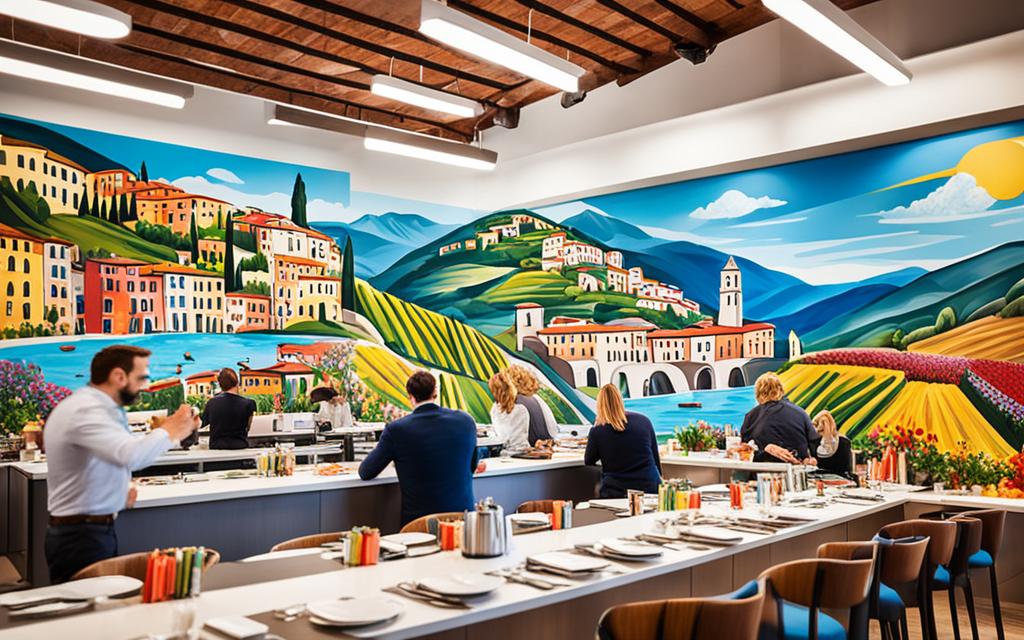Welcome to our comprehensive guide on Italian workplaces! In this article, we will delve into the fascinating culture and etiquette of Italian workplaces. Understanding these unique aspects will help you navigate your career in Italy with confidence and ease.
Italy is renowned for its rich cultural heritage, and this is reflected in the way Italians conduct business. From the importance of relationships to communication styles, work-life balance to dress code, and business etiquette to customs, we will cover it all. So, whether you are planning to work in Italy or you simply want to expand your knowledge, this article is for you.
Throughout the sections, we will provide insights and tips that will enable you to adapt seamlessly to the Italian work environment. Allying respect with the Italian workplace customs will help you form strong professional relationships and enhance your experience in the workplace.
So, without further ado, let’s embark on a journey to uncover the nuances of Italian workplaces, explore the vibrant culture, and unravel the intriguing etiquette that shapes the professional landscape in Italy. Get ready to gain valuable insights that will set you on the path to success!
The Importance of Relationships in Italian Workplaces
Italian workplaces value the power of relationships. Developing and nurturing a strong network of connections is considered essential for achieving success in this vibrant and dynamic professional landscape. In this section, we will explore how relationships play a pivotal role in shaping Italian workplace culture and why networking is of paramount importance.
Building meaningful relationships with colleagues, business partners, and clients is highly regarded in Italian workplaces. It goes beyond the confines of professional interactions and extends into personal connections. Italians believe that trust, loyalty, and mutual support form the foundation of prosperous collaborations. Therefore, investing time and effort in cultivating relationships is seen as a long-term investment and a crucial aspect of career advancement.
Networking events, social gatherings, and informal coffee breaks hold significant value in Italian workplaces. These activities provide opportunities for professionals to establish connections, exchange ideas, and create potential business opportunities. Italians appreciate the art of conversation and engaging in open dialogue, which further strengthens relationships and fosters collaboration.
The close-knit nature of Italian workplaces encourages an inclusive atmosphere where loyalty and strong personal bonds take precedence. Colleagues often socialize outside working hours, such as enjoying lunches or after-work drinks together. These personal connections contribute to a positive work environment and enhance teamwork, ultimately leading to increased productivity and job satisfaction.
Benefits of Strong Relationships in Italian Workplaces:
- Opportunities for collaboration and partnership
- Enhanced trust and mutual support
- Influence on decision-making processes
- Access to valuable knowledge and information
- Promotion of personal and professional growth
Building and maintaining relationships in Italian workplaces requires genuine interest, active participation, and respect for cultural nuances. Being proactive in expanding your network and nurturing connections will undoubtedly contribute to your success in the Italian professional landscape.
In the next section, we will explore the communication styles prevalent in Italian workplaces, delving into the nuances of verbal and non-verbal cues that shape professional interactions.
Communication Styles in Italian Workplaces
Effective communication plays a vital role in every workplace, and Italian workplaces are no exception. The way Italians communicate at work reflects their unique cultural norms and values. Understanding these communication styles is essential for fostering collaboration and building strong professional relationships in Italian workplaces.
Italian communication is characterized by a combination of verbal and non-verbal cues. Italians rely heavily on body language, facial expressions, and gestures to convey meaning. For example, hand gestures are commonly used to emphasize a point or express emotions. This visual component adds depth and nuance to conversations, enabling Italians to better understand each other.
Additionally, Italians tend to value directness in communication. They appreciate frankness and honesty, even in professional settings. However, it is important to strike a balance between directness and politeness. Italians place great importance on maintaining harmony and avoiding confrontation, so communication is often tactful and respectful.
In Italian workplaces, there is a delicate balance between formality and familiarity. While there is a level of professionalism and respect for hierarchy, relationships also play a significant role. Building personal connections and rapport with colleagues is considered essential for effective collaboration. Italians value trust and loyalty, and investing time in getting to know your colleagues can positively impact communication and teamwork.
Key Communication Styles in Italian Workplaces:
- Non-verbal cues: Italians rely on body language, facial expressions, and gestures to convey meaning.
- Directness and honesty: Italians appreciate frankness and value direct communication.
- Balance between formality and familiarity: Italian workplaces emphasize both professionalism and developing personal relationships.
By understanding and adapting to the communication styles prevalent in Italian workplaces, you can effectively navigate the cultural nuances and establish strong connections with colleagues and superiors. Developing your non-verbal communication skills and finding the right balance between directness and respect will contribute to your success in an Italian work environment.
Work-Life Balance and Working Hours in Italy
Maintaining a healthy work-life balance is highly valued in Italian culture. Italians prioritize their personal lives and believe in the importance of leisure time. Understanding the typical working hours and vacation policies in Italy will help you adapt to the Italian approach to work-life balance.
Typical Working Hours
In Italy, the standard working hours vary depending on the industry and region. However, a typical workday starts at 9 am and ends at 6 pm, with an hour-long lunch break from 1 pm to 2 pm. It’s common for businesses to close during the lunch break, allowing employees to enjoy a leisurely meal and recharge for the rest of the day.
However, it’s important to note that the working hours can be flexible, especially in larger cities like Rome and Milan. Many professionals may have the option to work remotely or have a more flexible schedule to accommodate their personal commitments.
Vacation Policies
Italians value their vacation time and believe in taking regular breaks to rejuvenate. The standard annual leave entitlement is around four weeks, but some companies may offer even more. It’s common for Italians to take extended vacations during the summer months, with many businesses closing for a few weeks in August.
During traditional Italian holidays such as Christmas and Easter, it’s also common for businesses to close or operate on reduced hours. This allows people to spend time with their families and celebrate these important occasions.
The Significance of Leisure Time
Leisure time holds great importance in Italian culture. Italians prioritize their personal lives and often engage in leisure activities such as spending time with family and friends, enjoying delicious food, and pursuing hobbies and interests. It is not uncommon to see Italians savoring a long lunch or taking an evening stroll after work.
Embracing the Italian approach to work-life balance means finding a harmonious blend of work and leisure. By taking regular breaks and engaging in activities that bring joy and relaxation, Italians believe that they can achieve not only professional success but also a fulfilling personal life.
Dress Code and Appearance in Italian Workplaces
Italians are renowned for their impeccable sense of style, and this extends to the workplace. In Italian workplaces, dress code and appearance are considered important aspects of professional etiquette. Adhering to the appropriate attire not only demonstrates respect for the workplace environment but also reflects cultural norms and values.
When it comes to dress code, Italian workplaces generally follow a formal or smart casual attire. Suits are commonly worn by both men and women in corporate settings, with darker colors such as navy, black, or charcoal being preferred. Men typically wear tailored suits, complete with matching trousers and a button-down shirt. Ties are also common accessories, adding a touch of formality to the attire. Women often opt for a well-fitted suit, a blouse, or a dress paired with appropriate footwear.
However, it’s essential to note that the dress code may vary depending on the industry and specific workplace. In more creative or casual environments, such as startups or media companies, the dress code may lean towards a smart casual or even business casual attire, allowing for some flexibility and individual expression.
It’s crucial to pay attention to neatness, cleanliness, and attention to detail when it comes to appearance. Italians appreciate well-groomed individuals who take pride in their personal presentation. This includes ensuring neatly styled hair, polished shoes, and minimal accessories that enhance rather than distract from the professional image.
As with any cultural context, it’s advisable to observe and align yourself with the dressing habits of your colleagues and superiors. This will demonstrate your respect for the workplace culture and help you to assimilate more seamlessly into Italian workplaces.
Business Etiquette and Customs in Italy
When it comes to conducting business in Italy, understanding the local etiquette and customs is essential for making a positive impression and building strong professional relationships. Italian business etiquette differs from that in other countries, so it’s important to familiarize yourself with the norms and expectations.
One key aspect of Italian business etiquette is greetings. Italians value personal connections, so a warm and friendly greeting is crucial. A firm handshake, direct eye contact, and a friendly smile are considered respectful and professional. It is also common to exchange business cards during introductions, presenting them with both hands and taking the time to study the card before putting it away.
In Italian business culture, meetings tend to be more relaxed and informal compared to some other countries. It is common for discussions to start with small talk, allowing participants to build rapport and establish a friendly atmosphere. Remember to always be punctual and prepared for meetings, as tardiness is seen as disrespectful. Italian professionals appreciate individuals who demonstrate a genuine interest in their culture and take the time to learn some basic Italian phrases.
Lastly, it’s important to dress professionally and stylishly in Italian workplaces. Italians place a strong emphasis on appearance and take pride in their personal style. Opt for well-tailored clothing and avoid anything too casual or flashy. Remember, dressing well shows respect for the occasion and the people you are meeting with.













